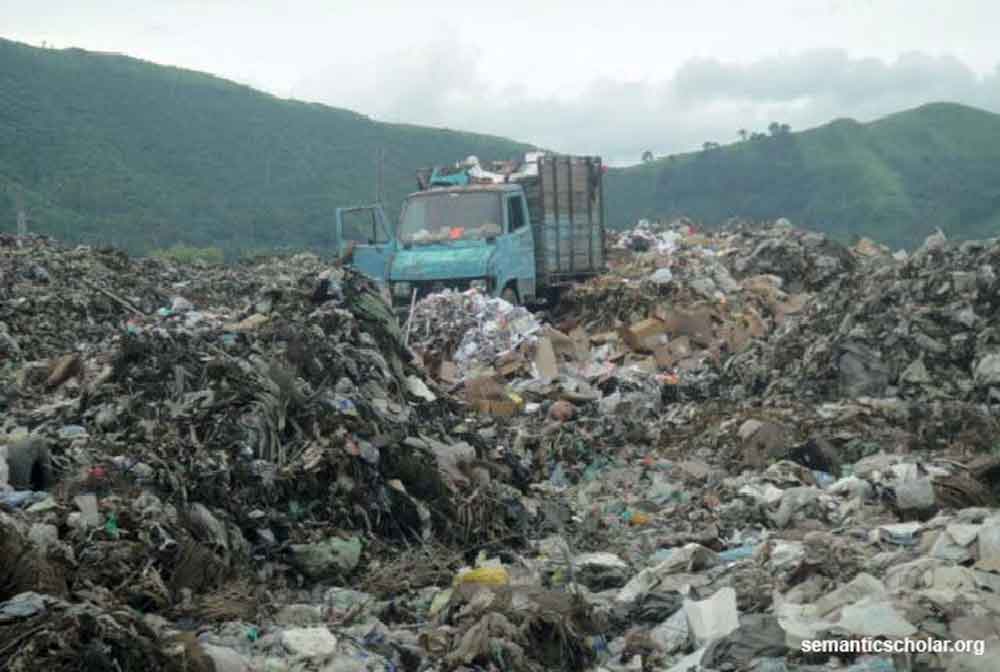Dr. N. Munal Meitei, Environmentalist,
email -nmunall@yahoo.in

Waste management or waste disposal is the processes and actions required to manage waste from its inception to its final disposal. This includes the collection, transport, treatment and disposal, together with monitoring and regulation of the waste management process and waste-related laws, technologies and economic mechanisms. Waste can be solid, liquid, or gases which include industrial, biological, household, municipal, organic, biomedical, radioactive wastes and each type has different methods of disposal and management.
Improper waste disposal poses a great threat to the environment and human health. Health issues can be directly linked by handling the waste or indirectly on consumption through water, soil and food. The aim of waste management is to reduce the adverse effects on human health, environment, planetary resources and aesthetics.
Waste management is a challenge for every cities and towns as effective waste management is relatively expensive, usually comprising 20%–50% of municipal budgets. India produces 62 million tons of waste annually, with 70% collected and only 12 million tons treated, while 31 million tons end up in landfills.
Effective ‘Waste Management’ involves the practice of ‘7R’ – Refuse, Reduce, Reuse, Repair, Repurpose, Recycle and Recover. Among these ‘7R’s, the first two, ‘Refuse’ and ‘Reduce’ relate to the non-creation of waste – by refusing to buy non-essential products and by reducing consumption. The next two, ‘Reuse’ and ‘Repair’ refer to increasing the usage of the existing product, with or without the substitution of certain parts of the product. ‘Repurpose’ and ‘Recycle’ involve maximum usage of the materials used in the product and ‘Recover’ is the recovery of embedded energy in the waste material.
Studies reported that, depending on the city, 2% to 24% of the municipal solid waste (MSW) in India gets burned, adding to the local ambient air pollution. This is also the case with the cities recognized as the cleanest in India by the MoHUA Swachh Survekshan, where up to 4% of MSW gets burned in the open every day.
The growing population and development produces more amount of waste impacting the environment. Many of the materials disposed of, can last anywhere for many years causing significant impacts in the natural environment including plants, animals and the planet.
If a landfill site is not properly sealed, “leachate” containing high levels of heavy metals, chemical compounds, pesticides and solvents can escape into the surrounding environment. Over 2 billion metric tons of waste is produced globally every year and if we continue the present strategies, the total waste projected in 2050 will be around 3.78 billion metric tons, creating the earth a trash bin.
The most common type of landfill, accounting for 31% globally, including Manipur, is an ‘open’ system. These landfills allow leaking out micro plastics, toxic chemicals and greenhouse gasses, like CO2 and methane. Currently India has only 86 incinerators across 25 states burning about 29 million tons of garbage annually. Open and unsanitary landfills contribute to contamination of drinking water and can cause infection and transmit dreaded diseases.
Electronic waste (e-waste) includes discarded computer monitors, motherboards, mobile phones and chargers, CDs, headphones, television sets, air conditioners and refrigerators. According to the Global E-waste Monitor 2017, India generates – 2 Mt of e-waste annually and ranks fifth among the e-waste producing countries, after United States, China, Japan and Germany.
This means that even though innovative climate mitigation strategies, including the development of various climate-resilient policies are trying to tackle the problem of climate change, our poor waste management is tarnishing these efforts.
Plastic dumped as waste cannot decompose but increases underground pressure, resulting in earthquakes. Dumped plastic are consumed by animals and fishes resulting in internal injury or deaths. Improper waste dumping leads to soil contamination to devoid from vegetation. Every animal has a range of habitats. However, waste reduces the size of the habitats leading to lost biodiversity. Waste also produces halogens affecting the ozone layer.
We often don’t consider places like landfills as “dead” space, but they’re exactly that. Land pollution happens whenever waste ends up on soil or other land that people should process instead. This garbage doesn’t just sit there; the contents break down, whether by rotting or time and, seep or spread around, causing dangerous for people and animals.
Our waste problem is severely plaguing the health of the planet’s species, including our own. Improper waste management could be the downfall of humanity, wildlife and the health of all ecosystems. It’s also a sobering fact that the developed countries only account for 16% of the world’s population, they are responsible for 34% of the world’s trash.
The solution, in the first place, is the minimisation of waste. Where waste cannot be avoided, recovery of materials and energy from waste as well as remanufacturing and recycle into usable products as a second option. Recycling leads to substantial resource savings as, for every ton of paper recycled, 17 trees and 50% of water can be saved. Moreover, recycling creates jobs: the sector employs 6 lakh people in India alone.
India is progressing on the path of development and industrialization. However, with industrialization, the production of waste is inevitable. When the waste produced is not treated properly, it poses a threat to our environment – air, water and land.
According to the annual report of the Central Pollution Control Board (CPCB) during 2020-21, municipal solid waste generated in Manipur is 282.3 tons per day (TPD), out of which 190.3 TPD are collected in which 108.6 TPD are treated and 81.7 TPD landfill. The uncollected 92 TPD of waste remains a pernicious to our environment.
In the state, house-to-house collection is covered in all 27 ULBs and segregation is being carried out in 22 ULBs only by transporting them in open vehicles. Open landfills are in operation at Imphal, Thoubal, Bishnupur, Kakching and Jiribam MC. The state has the complete ban on single use plastics since 2017, but an estimated 8292.8 TPA are produced during 2019-20.
Waste disposal is one of the most important industries in the world. There are several rules set for the management of waste, but they are not followed because of the lack of awareness among the people. The government needs to focus on waste and its impact on human health and plan a method to discarding waste wisely in order to protect people and the environment.
Thus, it is essential for people to aware of the harmful effects of dumping waste or burning it so that people actively participate in waste management. For many people, the reduction of waste and proper disposal may be a daunting task. However, every change we make to waste disposal can save the lives and the earth from a dangerous end.













